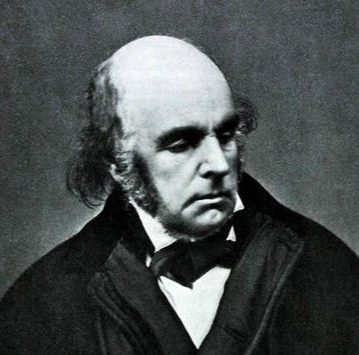Edward FitzGerald or Fitzgerald[1] (31 March 1809 – 14 June 1883) was an English poet and writer best known as a poet for the first and most famous English translation of The Rubaiyat of Omar Khayyam. This work has remained famous since the 1860s.
Beginning in 1859, FitzGerald authorized four editions (1859, 1868, 1872 and 1879) and there was a fifth posthumous edition (1889) of his translation of the Rubáiyát of Omar Khayyám (Persian: رباعیات عمر خیام). Three (the first, second, and fifth) differ significantly; the second and third are almost identical, as are the fourth and fifth. The first and fifth are reprinted almost equally often,[18][19] and equally often anthologized.[20]
A Book of Verses underneath the Bough,
A Jug of Wine, a Loaf of Bread – and Thou
Beside me singing in the Wilderness –
Oh, Wilderness were Paradise enow!
Title page from the first American edition of FitzGerald's translation, 1878
Stanza XI above, from the fifth edition, differs from the corresponding stanza in the first edition, wherein it reads: "Here with a Loaf of Bread beneath the bough/A Flask of Wine, a Book of Verse – and Thou". Other differences are discernible. Stanza XLIX is more well known in its incarnation in the first edition (1859):
'Tis all a Chequer-board of Nights and Days
Where Destiny with Men for Pieces plays:
Hither and thither moves, and mates, and slays,
And one by one back in the Closet lays.
The fifth edition (1889) of stanza LXIX, with different numbering, is less familiar: "But helpless Pieces of the Game He plays/Upon this Chequer-board of Nights and Days;/Hither and thither moves, and checks, and slays,/And one by one back in the Closet lays."
FitzGerald's translation of the Rubáiyát is notable for being a work to which allusions are both frequent and ubiquitous.[11] It remains popular, but enjoyed its greatest popularity for a century following its publication, wherein it formed part of the wider English literary canon.[11]
One indicator of the popular status of the Rubáiyát is that, of the 101 stanzas in the poem's fifth edition, the Oxford Dictionary of Quotations (2nd edition) quotes no less than 43 entire stanzas in full, in addition to many individual lines and couplets. Stanza LI, also well-known, runs:
The Moving Finger writes; and, having writ,
Moves on; nor all your Piety nor Wit
Shall lure it back to cancel half a Line,
Nor all your Tears wash out a Word of it.
Lines and phrases from the poem have been used as the titles of many literary works, among them Nevil Shute's The Chequer Board, James Michener's The Fires of Spring and Agatha Christie's The Moving Finger. Eugene O'Neill's Ah, Wilderness alludes to the Rubáiyát without making a direct quotation. Allusions are frequent in the short stories of O. Henry.[21] Saki's pseudonym makes reference to it. The popular 1925 song A Cup of Coffee, A Sandwich, and You, by Billy Rose and Al Dubin, echoes the first of the stanzas quoted above.
Parodies
FitzGerald's translations were popular in the century of their publication, also with humorists for the purpose of parody.[11]
The Rubáiyát of Ohow Dryyam by J. L. Duff utilises the original to create a satire commenting on Prohibition.
Rubaiyat of a Persian Kitten by Oliver Herford, published in 1904, is the illustrated story of a kitten in parody of the original verses.
The Rubaiyat of Omar Cayenne by Gelett Burgess (1866–1951) was a condemnation of the writing and publishing business.
The Rubaiyat of Omar Khayyam, Jr. (1971) by Wallace Irwin purports to be a translation from "Mango-Bornese" chronicling the adventures of Omar Khayyam's son "Omar Junior" – unmentioned in the original – who has emigrated from Persia to Borneo.
Astrophysicist Arthur Eddington wrote a parody about his famous 1919 experiment to test Albert Einstein's general theory of relativity by observing a solar eclipse.
The new Rubaiyat: Omar Khayyam reincarnated by "Ame Perdue" (pen name of W.J. Carroll) was published in Melbourne in 1943. It revisits the plaints of the original text with references to modern science, technology and industry.
